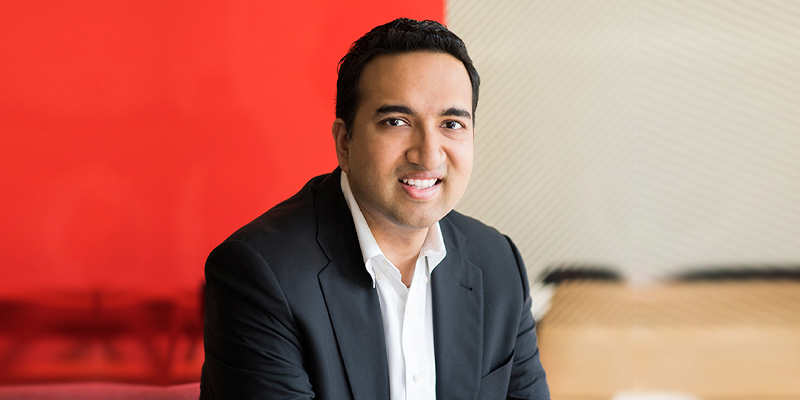Somesh Dash, General Partner at Institutional Venture Partners (IVP), has his roots in Odisha. However, he was brought up in California, US, and completed his graduation in Business Administration from UC Berkeley in 2001. Post which, the US job market was hit after the 9/11 attacks, and Somesh had to return to India and joined Sony Entertainment. In 2005, Somesh returned to the US and joined IVP. He also did his MBA from Stanford University in 2010.

Somesh Dash, General Partner at Institutional Venture Partners
IVP was founded over four decades ago and has invested in over 400 companies. Some of its portfolio companies include Twitter, Netflix, Uber, Zynga, Slack, Dropbox, GitHub, Grammarly, and Soundcloud, among others. IVP has also seen 114 of its portfolio companies going public.
In the latest episode of Prime Venture Partners’ 100x Entrepreneur Podcast, a series featuring founders, venture capitalists, and angel investors, Somesh spoke to Siddharth Ahluwalia on his learnings from the crisis of 2002 and 2008, investing in resilient companies, and the importance of mental health.
Exit thesis
Somesh joined IVP 15 years ago. The multistage firm has been exclusively focussing on technology growth for 20 years now. “What we focus on is when companies hit an inflection point around growth, and we start seeing the momentum build. We look for companies that are at 10 to 100 -- 10 of ARR, 10 of revenue with the path to 100,” he explains.
Often, IVP gets involved in companies which have a path to billion revenue or ARR, like that of Netflix.
IVP’s first investment was Seagate Technologies in the 1980s. It had invested in Seagate when the company went public and IVP bought at the IPO. “One important thing we have learned in an IPO is financing. It is a great milestone for the company. It is an important event, but it is not the end,” Somesh says.
He adds that many assume that an IPO is the end destination. However, at IVP, the belief is that IPO is just a part of the journey. The VC firm has a long-term focus on partnering with entrepreneurs.
Lessons from the ecosystem
Growing up as an Indian American, Somesh says he lived by one quote -- “Disappointment comes to those who make appointments with the future.”
He believes there is no greater evidence to this quote in the last six months. Despite being well-informed about what was going on globally, nobody predicted the pandemic, economic volatility, unrest on civil rights in the US, and a potential war between India and China. “All of this is unprecedented..and we are really in historic times,” he says.
Somesh has drawn a number of lessons from this experience. He says, a great way to understand the future is by looking at the past.
“The Silicon Valley is exceptional in looking at the future, but negligent looking at the past. There are lessons to be learned from 2002 and 2008,” he says.
He adds that companies that manage their own destiny in terms of their own capitalisation typically survive and thrive when the economy comes back to normalcy. In 2002 and the Great Recession of 2008, high burn companies were volatile and unpredictable, and many of them did not live to see another day. Whereas companies that were able to cut their burn rates and managed through the tough economic periods by doubling down exceptional market-fit, investing in research and development, but cutting all discretionary spend, had advantage over others.
“The unique thing that COVID-19 is teaching us is that the two biggest areas of spend for any venture funded company in the US are rent and labour,” Somesh says.
When it comes to rent, he says, commercial real estate is predominantly a big waste of money. He adds that post COVID-19, companies will move to a hybrid work mode. “People are more productive, they’re less stressed, and they are hybrid. There are many things that you want to do in person, in small groups. But there are also so many things, especially one-on-one communication that you can do through video conferencing,” he adds.
He believes there is going to be a global workforce of skilled tech workers and that will benefit the Indian startup ecosystem. When it comes to deep stream training, engineering and business process minded knowledge, India has the best labour. Additionally, geographic barriers will now vanish, and “the next generation of startups will have people in the US, who will harness people in India and parts of Asia, and they’ll look for potential sales talent and go to market in Europe. I think there’ll be much more hybrid and fluid,” Somesh adds.
This would also enable Indian startups to recruit experienced employees from the Silicon Valley. “I think companies that use COVID-19 as an opportunity as much as a threat will really do well,” he says.
Starting a career after 9/11
When the recession started in the US in 2001, the dot com boom was turning into the dot com burst. It was the time Somesh was going to work for a consulting firm in the Bay Area. However, after his graduation, he got deferred for a year and started exploring opportunities in India, a country where he always dreamt of living in.
One of his family friends was an investor in Sony when India’s cable business was liberalised. Thus, he got the opportunity to work with Sony Entertainment Television in Mumbai. At Sony, Somesh created an online film festival and looked into film acquisitions.
Growth-stage investment thesis
Somesh says, at IVP, every investment is perceived as a firm investment, instead of an individual’s deal.
“We share credit, and we take accountability and blame when things go really well across the portfolio or they go poorly. We’re celebrating our 40th year as a firm,” he says. This, Somesh believes, is the key reason behind IVP’s success.
IVP always invests in technologies that are looking to solve issues within the corporate sector. Post the internet boom in the early 90s, IVP was an early investor and one of its most important investments in the last 40-years has been Netflix where IVP was an early investor.
“When I joined the firm, I was fascinated how the internet was transforming everything...That time, a friend of mine joined a small startup as employee number seven, and I got a chance to hang out with them. The startup was actually Facebook,” he reveals.
In his very first year at IVP, he witnessed how Facebook innovated and built a whole new form of advertising and social engagement model on the web. “It was sort of eye-opening for me and that perspective led us to the Series B funding round of Twitter,” he adds.
Having said that, Somesh says, as investors, IVP supports startup founders and pushes them when they need to be pushed. The ultimate job of an investor should be to be sounding boards to founders and not have a ‘Control Mentality.’ Investors should not get into the way of founders and credit should be due to them.
He says: “To be in some sense tough critics in private, and the biggest cheerleaders in public,” is the way to encourage founders, especially in difficult times like this.
Investing in mental wellness
Somesh says that mental health is a very dear topic to his heart. Even in the US, mental health was and is a taboo topic. He believes that since the beginning of the coronavirus pandemic, people have started recognising the fact that wellness, mindfulness, and mental health are not just fringe topics and things that the rich need to focus on, or have the ability to indulge in. They are actually the fundamentals to the well-being of the population.
His first investment in the mental health space was in a company called Thrive Global, which is run by a Greek immigrant in the US and the Co-founder of Huffington Post, Arianna Huffington.
“She had really cornered this idea that sleep and mindfulness were not only a way to increase happiness, they’re actually ways to increase productivity,” he says.
IVP’s recent investment is Lyra, founded by David Abrams, the former CFO of Facebook. The company brings together all therapists under one umbrella and makes them available for a company’s employees.
“Mental health is not a choice. It is a chemical reaction that occurs, you don’t choose to have it or not have it. I think people need to be aware that it is just as debilitating if not more than a physical ailment. Secondly, it is okay to seek therapy. It is okay to seek help. You shouldn’t have a stigma associated with you, you should be celebrated for doing that,” Somesh says.
(Edited by Megha Reddy)
Want to make your startup journey smooth? YS Education brings a comprehensive Funding Course, where you also get a chance to pitch your business plan to top investors. Click here to know more.
Link : https://yourstory.com/2020/07/netflix-twitter-uber-ivp-investment-thesis-somesh-dash
Author :- Debolina Biswas ( )
July 02, 2020 at 05:45AM
YourStory

